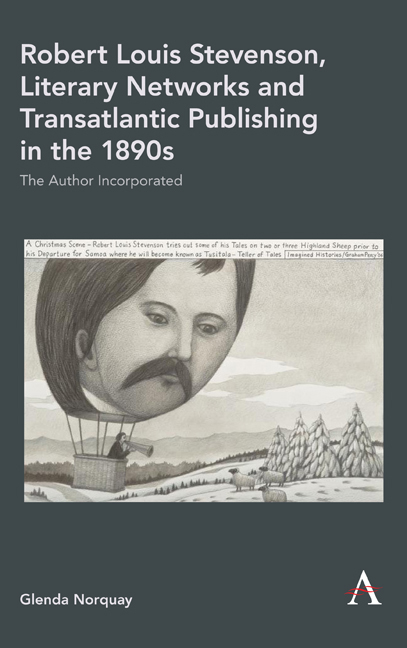 Robert Louis Stevenson, Literary Networks and Transatlantic Publishing in the 1890s
Robert Louis Stevenson, Literary Networks and Transatlantic Publishing in the 1890s Book contents
- Frontmatter
- Contents
- Acknowledgements
- Abbreviations
- Introduction
- 1 Lemuel Bangs: ‘The Senator’
- 2 A Tale of Two Texts
- 3 ‘A Gentleman Called Charles Baxter’
- 4 Sidney Colvin: Custodian and Monument
- 5 Family, Friends and Collaborators
- 6 Arthur Quiller-Couch: The Quivering Needle
- 7 Richard Le Gallienne: ‘Not While a Boy Still Whistles’
- Conclusion: Robert Louis Stevenson Incorporated
- References
- Index
5 - Family, Friends and Collaborators
Published online by Cambridge University Press: 16 February 2020
- Frontmatter
- Contents
- Acknowledgements
- Abbreviations
- Introduction
- 1 Lemuel Bangs: ‘The Senator’
- 2 A Tale of Two Texts
- 3 ‘A Gentleman Called Charles Baxter’
- 4 Sidney Colvin: Custodian and Monument
- 5 Family, Friends and Collaborators
- 6 Arthur Quiller-Couch: The Quivering Needle
- 7 Richard Le Gallienne: ‘Not While a Boy Still Whistles’
- Conclusion: Robert Louis Stevenson Incorporated
- References
- Index
Summary
Stevenson was less interested in maintaining the boundaries of the authorial body than many of his contemporaries: prosthetic performance in writing, in which more than one person took on the body of the author or performed a part of the creative process, did not seem to perturb him. He was unusually willing to collaborate, less exercised than other writers when it came to notions of literary possession, and frank and self-reflective about the material ‘stolen’ from his own reading. Most memorably, in ‘My First Book Treasure Island’ he acknowledged how ‘plagiarism’ happens, describing the moment he recognized his sources for the novel:
I am now upon a painful chapter. No doubt the parrot once belonged to Robinson Crusoe. No doubt the skeleton is conveyed from Poe. I think little of these, they are trifles and details; and no man can hope to have a monopoly of skeletons or make a corner in talking birds. The stockade, I am told, is from Masterman Ready. It may be, I care not a jot […] It is my debt to Washington Irving that exercises my conscience, and justly so, for I believe plagiarism was rarely carried farther. I chanced to pick up the Tales of a Traveller some years ago, with a view to an anthology of prose narrative, and the book flew up and struck me: Billy Bones, his chest, the company in the parlour, the whole inner spirit and a good deal of the material detail of my first chapters – all were there, all were the property of Washington Irving. But I had no guess of it then as I sat writing by the fireside, in what seemed the springtide of a somewhat pedestrian inspiration; nor yet day by day, after lunch, as I read aloud my morning's work to the family.
His frank, rueful yet celebratory tone challenges Romantic models of creativity in which ‘visions of literary making are intimately linked with the concept of a singular creator: the creative urge is dramatized as pulsing deep within the fastness of the individual self, and the solitary writer is seen to conjure ideas into the influence– proofed chamber of his or her imagination.’ Stevenson noted that while writing Treasure Island, ‘It seemed to me original as sin; it seemed to belong to me like my right eye.’
- Type
- Chapter
- Information
- Robert Louis Stevenson, Literary Networks and Transatlantic Publishing in the 1890sThe Author Incorporated, pp. 131 - 160Publisher: Anthem PressPrint publication year: 2020


